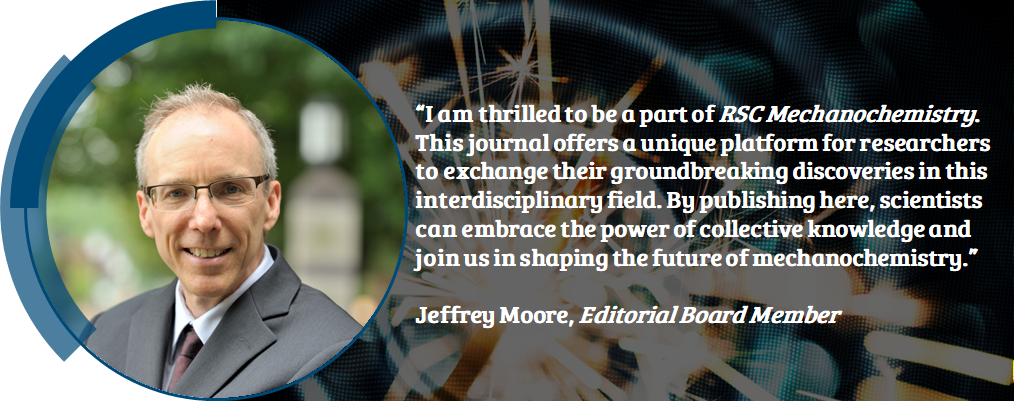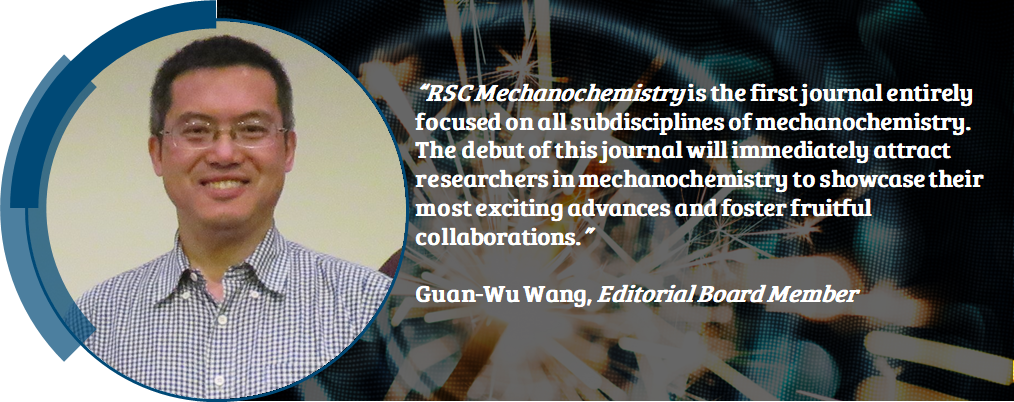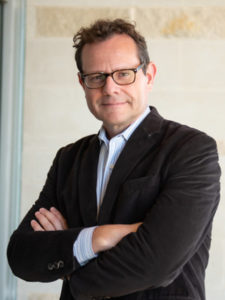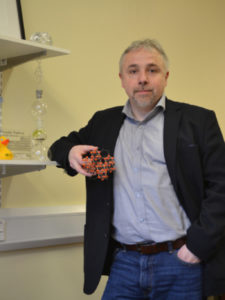
We are delighted to introduce to you our Editors-in-Chief for RSC Mechanochemistry, Professors James Batteas and Tomislav Friščić.
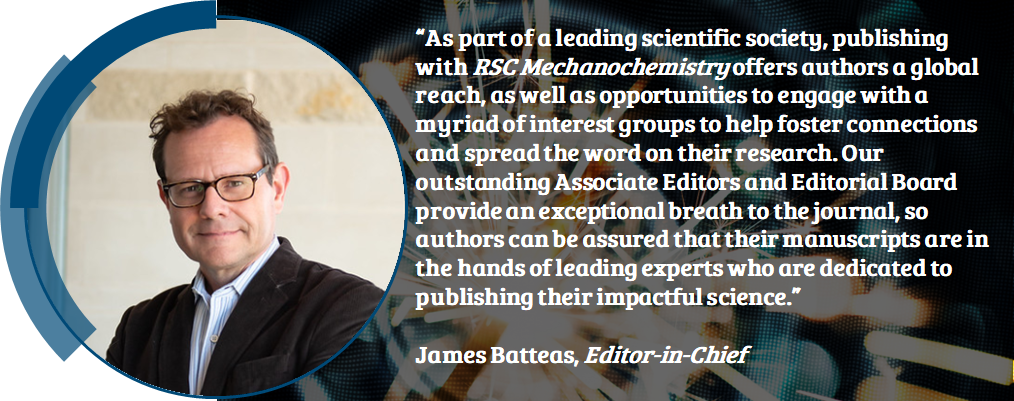
Learn more about James Batteas
Professor James Batteas is a Regents Professor and D. Wayne Goodman Professor of Chemistry, and a Professor of Materials Science and Engineering at Texas A&M University (TAMU). He earned a B.S. in Chemistry from the University of Texas at Austin in 1990, and a Ph.D. in Chemistry from the University of California at Berkeley in 1995. He is an expert in the materials chemistry of surfaces and interfaces, with research activities spanning a broad range of fundamental surface and interfacial phenomena. These include organic molecular electronics, catalysis, plasmonics, tribology, “smart” surfaces, and self-organizing nanoscale materials. His research in tribology focuses on the bridge between chemistry and mechanics, where his lab conducts atomic-scale studies of friction and wear of materials. Here he has extended this work into fundamental studies of mechanochemistry, and he currently directs the NSF Center for the Mechanical Control of Chemistry. He has been recognized twice by TAMU for excellence in teaching, receiving Association of Former Students Distinguished Teaching awards at both the college and university levels. He was elected a Fellow of the Royal Society of Chemistry in 2012. He previously served as an Associate Editor (2011 – 2014) and Editorial Board Member for RSC Advances (2011 – 2021) and on the Editorial Advisory Board of ACS Central Science (2014-2020).
Read some of his recent publications:
Studies of the Reactivity of Graphene Driven by Mechanical Distortions
Nathaniel Hawthorne, Sayan Banerjee, Quentarius Moore, Andrew M. Rappe and James D. Batteas
J. Phys. Chem. C 2022, 126, 17569-17578
Mechanical and Electronic Properties of Diacetylene and Polydiacetylene Self-Assembled Monolayers on Au(111)
Fanglue Wu, N.V.S. Dinesh K. Bhupathiraju, Andrew Brown, Zhuotong Liu, Charles M. Drain and James D. Batteas
J. Phys. Chem. C 2020, 124, 4081-4089
Formation of Coherent 1H-1T Heterostructures in Single-Layer MoS2 on Au(111)
Fanglue Wu, Zhuotong Liu, Nathaniel Hawthorne, Michael Chandross, Quentarius Moore, Nicolas Argibay, John F. Curry and James D. Batteas
ACS Nano 2020, 14, 16939-16950
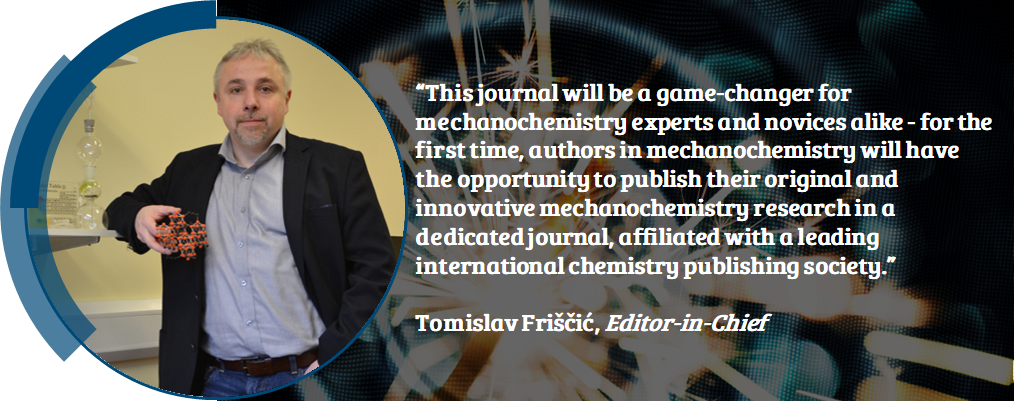
Learn more about Tomislav Friščić
Tomislav Friščić is a Professor and Leverhulme International Chair in Green and Sustainable Chemistry at the University of Birmingham. His team is developing the solid state as a medium for safer, environmentally-friendly synthesis and functional materials design – with mechanochemistry and photochemistry playing central roles. He received a B.Sc. in Chemistry with Branko Kaitner, focusing on Chemical Crystallography (University of Zagreb, 2001), Ph.D. in organic solid-state supramolecular chemistry and photochemistry with Leonard MacGillivray (University of Iowa, 2006), followed by post-doctoral research with William Jones at the Pfizer Institute for Pharmaceutical Materials Science, and a Herchel Smith Fellowship at the University of Cambridge (2008). He was a Professor and Tier-1 Canada Research Chair in Mechanochemistry and Solid-State Chemistry at McGill University until 2022.
He is a Fellow of the Royal Society of Chemistry, a member of the College of New Scholars, Artists and Scientists of the Royal Society of Canada, and a corresponding member of the Croatian Academy of Sciences and Arts. He is a co-founder of two “CleanTech” companies. His group’s work was recognised by awards, including the Royal Society of Chemistry Corday-Morgan Prize (2023), the NSERC John C. Polany Award (2022), the Brusina Medal of the Croatian Society of Natural Sciences (2021), the Royal Society of Canada Rutherford Medal (2018), Steacie Prize for Natural Sciences (2018), etc.
Read some of his recent publications:
Resonant acoustic mixing (RAM) for efficient mechanoredox catalysis without grinding or impact media
Farshid Effaty, Lori Gonnet, Stefan G. Koenig, Karthik Nagapudi, Xavier Ottenwaelder and Tomislav Friščić
Chem. Commun. 2023, 59, 1010-1013
Rapid, room-temperature, solvent-free mechanochemical oxidation of elemental gold into organosoluble gold salts
Jean-Louis Do, Thomas Auvray, Cameron B. Lennox, Hatem M. Titi, Louis A. Cuccia and Tomislav Friščić
Green Chem. 2023, 25, 5899-2906
Mechanochemistry for Synthesis
Tomislav Friščić, Christina Mottillo and Hatem M. Titi
Angew. Chem. Int. Ed. 2020, 59, 1018-1029
RSC Mechanochemistry will open for submissions at the end of September 2023. Find out more about the journal on our webpage and sign up for e-alerts to make sure you receive the latest news.

